News from Maison de la Gare
An Evening with Talibé Children for whom Things Just Got Even Worse
Tweeter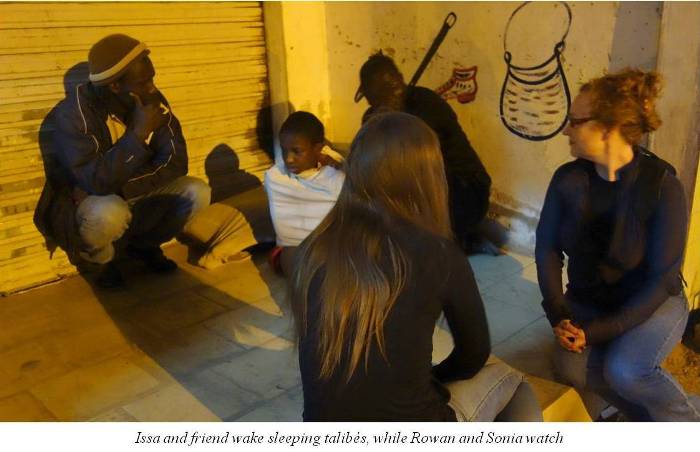
Sonia LeRoy and Rowan Hughes share an extraordinary experience
I have had the good fortune to travel
to Senegal on many occasions to support the work of Maison de la Gare in aid of talibé
street children. My teenage daughter, Rowan, has accompanied me in this work three
times, becoming personally committed to the cause of ending forced begging and
supporting Maison de la Gare in bringing hope to the talibés of Saint Louis. On a
previous visit, we accompanied Issa Kouyaté on one of his regular midnight "Rondes
de nuit" in search of runaway talibé children. And, on our most recent visit, we
spent an evening with the runaway boys currently in the care of Maison de la Gare.
Rowan writes: "I volunteered for the first time with Maison de la Gare in 2012.
I had an amazing experience delivering books, organizing the library, and setting up
e-mail accounts for some of the talibé children. It wasn't until my second trip that
I went out onto the streets and into some daaras. I was shocked and very emotional
at the conditions I saw in the daaras where my friends had to live. But the most
powerful part for me was going out on what are called night rounds.
On night rounds Issa, and in this case me, my mother, my grandfather and a man who
helps Issa find runaways, went out in search of talibé boys who have left their
daaras and are living on the streets. Issa talks with them and convinces them to
go back to his home where they can stay until authorities give the go-ahead for
Maison de la Gare to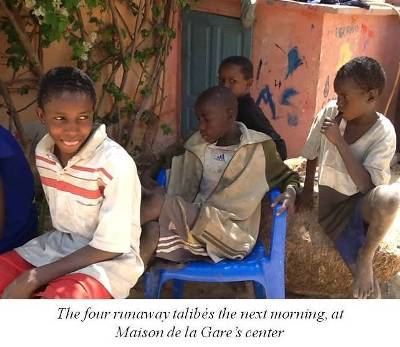 take them back to their villages or, in some cases, return them
to their daaras. We headed out at one in the morning when it was pitch black.
take them back to their villages or, in some cases, return them
to their daaras. We headed out at one in the morning when it was pitch black.
The usually chaotic streets of Saint Louis were dead quiet, and after a day of about
35 degrees (95 F), it was suddenly cold. We met Issa and then took a taxi to a
place where an informant had told him that there may be kids sleeping. The first
place we checked was a parking lot for buses and taxis. It was explained to me that
runaways will often sleep under cars to stay hidden from pedophiles or others who
could hurt them.
We were leaving the lot and heading back into the streets when we saw them. Four
young boys in a lighted corner huddled together. They used their tee-shirts to
cover their whole bodies by pulling them over their heads and tucking in arms,
legs and feet. Issa gently woke them one by one, talking to them in Wolof, and
convinced them to come with us. I couldn't help but wonder what they might be
thinking. Imagine some strangers waking you up in the middle of the night and
asking you to go with them. Issa pointed out that one of the little boys named
Gora had likely been sexually assaulted. He couldn't have been older than 7.
My heart almost broke. There he was shivering in the corner, looking at me.
I wasn't sure what to do; all I wanted to do was give him a hug and tell him
everything would be okay. But of course I can't speak Wolof, so I gave him
my sweater.
We took the four boys back to Issa's apartment in taxis and got them settled
down with blankets.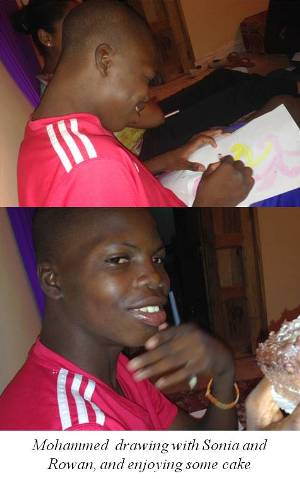 The next morning we went to the centre and the boys from
the night before were there. Despite the heat, I saw Gora was still wearing
my sweater, and I swear I saw him smile at me just once."
The next morning we went to the centre and the boys from
the night before were there. Despite the heat, I saw Gora was still wearing
my sweater, and I swear I saw him smile at me just once."
During our most recent trip, Maison de la Gare was caring for four other
runaway talibés in Issa's small apartment. Rowan and I brought a take-out
meal and colouring supplies and settled in for the evening while Issa had to
be out of the house for a meeting. Each child has his own story. But what
they have in common is that they are all children denied their basic human
rights. And they are denied what all children need, attention and affection.
Mohammed is a fifteen year old boy. He is from Dakar, and he came to
Saint Louis to work. He seems even younger than his age, and was soon being
exploited. He loves to draw. Mohammed drew pictures of a marabout whipping
a crying child, and of crying children holding insufficient coins for their
quotas in their hands.
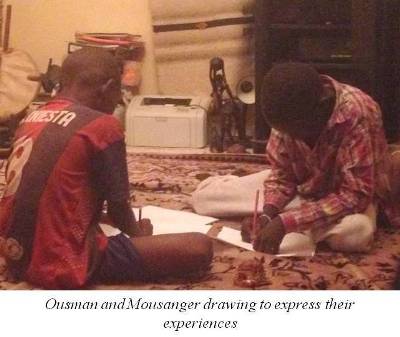
Ousman, about age 8, and Mousanger, age 12, were picked up by the local
police for stealing. Talibé children who are desperate to meet their quotas
may resort to stealing to avoid feared consequences. The police had entrusted
the children to Issa. Both boys thoroughly enjoyed their meals and the company.
They both drew picture after picture of the food we ate that night, offering
some of the drawings to us as gifts.
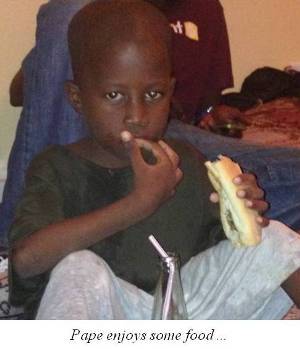 The most heartbreaking case was Pape, a child of only five years. He had
severe injuries on his ankles where his marabout had kept him chained for days.
His situation is considered severe and the police have called his marabout to
present himself for questioning. The marabout, however, has made himself
scarce. Perhaps the marabout will reappear once the wounds have had a chance
to heal and he considers the evidence erased. Issa's photo record will be
waiting. Pape was shy and quiet. He drew many pictures of his village and
clearly indicated
The most heartbreaking case was Pape, a child of only five years. He had
severe injuries on his ankles where his marabout had kept him chained for days.
His situation is considered severe and the police have called his marabout to
present himself for questioning. The marabout, however, has made himself
scarce. Perhaps the marabout will reappear once the wounds have had a chance
to heal and he considers the evidence erased. Issa's photo record will be
waiting. Pape was shy and quiet. He drew many pictures of his village and
clearly indicated 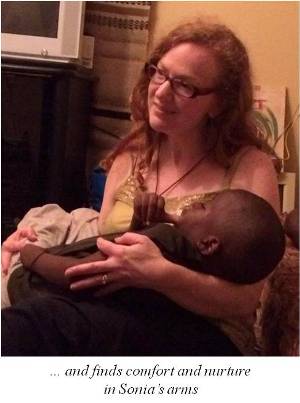 his desire to go home. He climbed quietly into my arms and
settled in for a snuggle too long denied him. He stayed with me, leaning
close for hours, and was disappointed to be gently laid on his mat when it
was time for Rowan and I to leave.
his desire to go home. He climbed quietly into my arms and
settled in for a snuggle too long denied him. He stayed with me, leaning
close for hours, and was disappointed to be gently laid on his mat when it
was time for Rowan and I to leave.
Rowan gave friendship bracelets to each of the boys to remember us by. They
wore them proudly. We will think of them as they navigate their challenging
lives in the days and years to come. At least we are comforted by the
knowledge that Maison de la Gare, at least, watches out for children such
as these, and will do all they can to guide them on their way.







